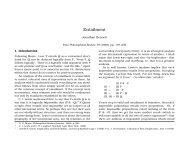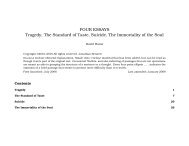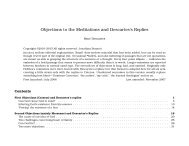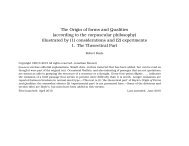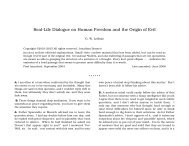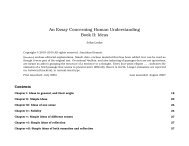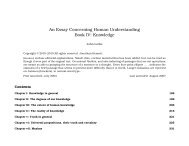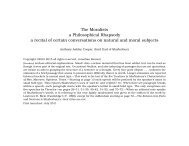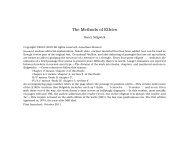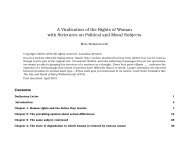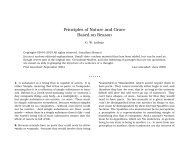The Form and Principles of the Sensible and Intelligible World
The Form and Principles of the Sensible and Intelligible World
The Form and Principles of the Sensible and Intelligible World
You also want an ePaper? Increase the reach of your titles
YUMPU automatically turns print PDFs into web optimized ePapers that Google loves.
<strong>The</strong> <strong>Sensible</strong> <strong>and</strong> <strong>Intelligible</strong> <strong>World</strong> Immanuel Kant I: <strong>The</strong> notion <strong>of</strong> a world in general<br />
•what it is like. In this context, ‘matter’ is used not in its everyday<br />
empirical sense, st<strong>and</strong>ing for •a certain kind <strong>of</strong> stuff, but ra<strong>the</strong>r in its<br />
‘transcendental’ sense, st<strong>and</strong>ing for •<strong>the</strong> things-or-stuff that <strong>the</strong> world is<br />
made <strong>of</strong>—<strong>the</strong> whatever-it-is that has <strong>the</strong> ‘form’.]<br />
It doesn’t matter whe<strong>the</strong>r my definition <strong>of</strong> ‘world’ squares<br />
with <strong>the</strong> word’s meaning in ordinary language, because what<br />
I am investigating is just <strong>the</strong> problem—arising according<br />
to <strong>the</strong> laws <strong>of</strong> reason—<strong>of</strong> •how a number <strong>of</strong> substances<br />
can coalesce into one, <strong>and</strong> •what brings it about that this<br />
one is not a part <strong>of</strong> anything else. ·I use ‘world’ to mean<br />
‘something that has parts <strong>and</strong> isn’t itself a part’, but that bit<br />
<strong>of</strong> terminology isn’t essential to my inquiry·. [Kant goes on<br />
to say that <strong>the</strong> ordinary-language meaning <strong>of</strong> ‘world’ does<br />
in fact square with his technical meaning for it. He skips<br />
through a few views about ‘worlds’ that are wrong when<br />
<strong>the</strong> word is taken in his sense <strong>and</strong> that ordinary thoughtful<br />
people would also think to be wrong. For example, Leibniz’s<br />
view that ‘each soul is a little world’.] A final point: I haven’t<br />
said anything about whe<strong>the</strong>r <strong>the</strong> substances that make up a<br />
world are contingent or necessary; nor do I follow <strong>the</strong> usual<br />
procedure <strong>of</strong> •building an answer to that question into my<br />
definition <strong>and</strong> <strong>the</strong>n ·triumphantly· •extracting it again by<br />
‘argument’! I’ll show later on that <strong>the</strong> conditions I have laid<br />
down abundantly prove that <strong>the</strong> substances are contingent.<br />
II. <strong>Form</strong>, which consists in <strong>the</strong> co-ordination <strong>of</strong> substances—<br />
not in <strong>the</strong> subordination <strong>of</strong> <strong>the</strong>m. Co-ordinates are mutually<br />
related as complements forming a whole; subordinates are<br />
related as •cause <strong>and</strong> effect or more generally as •ground<br />
<strong>and</strong> consequent. Co-ordination is reciprocal, <strong>and</strong> <strong>the</strong> same<br />
names are used for each <strong>of</strong> <strong>the</strong> related items—each <strong>of</strong> <strong>the</strong>m<br />
refers to <strong>the</strong> o<strong>the</strong>r as determining it <strong>and</strong> being determined<br />
by it. In subordination <strong>the</strong> names are different for <strong>the</strong> two related<br />
items—one is spoken <strong>of</strong> purely in terms <strong>of</strong> •dependency,<br />
<strong>the</strong> o<strong>the</strong>r purely in terms <strong>of</strong> •causality. This co-ordination is<br />
3<br />
conceived as real <strong>and</strong> objective, not as ideal <strong>and</strong> subjective,<br />
arising from someone’s arbitrarily choosing to think <strong>of</strong> some<br />
aggregate as a whole. By embracing a plurality ·in your<br />
thought· you can easily fashion a representation-<strong>of</strong>-a-whole,<br />
but it won’t be a representation <strong>of</strong> an ·actual objective· whole.<br />
<strong>The</strong> difference I am talking about is that between<br />
(a) a genuine objective world: an aggregate <strong>of</strong> substances<br />
that are held toge<strong>the</strong>r by bonds <strong>of</strong> transeunt [see<br />
Glossary] causation linking <strong>the</strong>m with one ano<strong>the</strong>r, <strong>and</strong><br />
(b) an aggregate <strong>of</strong> substances whose toge<strong>the</strong>rness consists<br />
only in <strong>the</strong>ir being forced toge<strong>the</strong>r by a unifying<br />
act <strong>of</strong> thought.<br />
[Kant speaks <strong>of</strong> (b) as involving a plurality <strong>of</strong> worlds held toge<strong>the</strong>r in a<br />
single thought, but that must have been a slip <strong>of</strong> <strong>the</strong> pen.] Let’s be<br />
clear about (a): what constitutes <strong>the</strong> essential form <strong>of</strong> a<br />
world—<strong>the</strong> fact about it that is absolutely required for it<br />
to be a world—is not any set <strong>of</strong> facts about how transeunt<br />
causation plays out among <strong>the</strong> world’s parts. Those facts<br />
are all contingent; <strong>the</strong>y concern what state <strong>the</strong> world is<br />
in, but are irrelevant to its status as a world. [<strong>The</strong> bold type<br />
<strong>of</strong> this next bit is explained in <strong>the</strong> note at <strong>the</strong> top <strong>of</strong> page 1.] What’s<br />
essential to <strong>the</strong> world qua world is <strong>the</strong>re being some principle<br />
[see Glossary] that makes it possible for <strong>the</strong>re to be transeunt<br />
causation among <strong>the</strong>se substances—possible for <strong>the</strong>se substances,<br />
though independent <strong>of</strong> one ano<strong>the</strong>r so far as <strong>the</strong>ir<br />
•existence is concerned, to depend on one ano<strong>the</strong>r for <strong>the</strong><br />
•states <strong>the</strong>y are in. Without such a principle, <strong>the</strong>re couldn’t<br />
be transeunt force in <strong>the</strong> world.<br />
Because this form is essential to a world ·that has it·,<br />
it can’t be changed in any way. ·<strong>The</strong>re are two reasons for<br />
this·. (i) it is secured by logic. In every change, some one<br />
thing goes from being F to being G. Note <strong>the</strong> need for a<br />
single thing to continue through <strong>the</strong> change. It’s <strong>the</strong> same<br />
with <strong>the</strong> world: through all its successive states it remains



